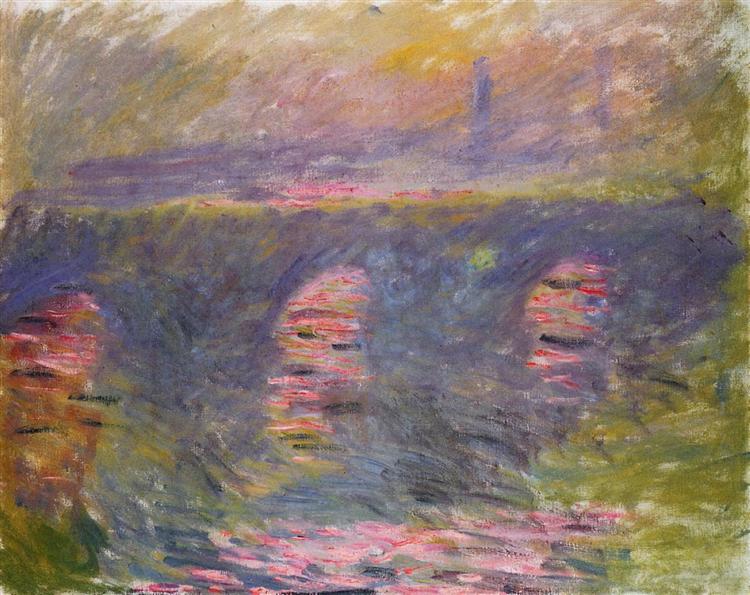Description
In 1901, Claude Monet produced one of his most evocative works: Waterloo Bridge. One of a series of paintings the artist produced throughout his life around this iconic London bridge, this painting captures the essence of Impressionism through a remarkable mastery of colour and light. Known for his ability to observe and record changing light and its effects on the landscape, Monet achieves an almost ethereal atmosphere in this work, immersing the viewer in a diffuse, dreamlike landscape.
The composition focuses on the majestic structure of Waterloo Bridge, which rises over the River Thames, although it is not depicted in rigorous architectural detail; instead, the bridge becomes an almost background element, shrouded in mist and light. This approach indicates Monet's interest not in the literal representation of reality, but in capturing a sensation, a moment in time where the atmosphere becomes paramount.
The use of colour is one of the most fascinating aspects of this work. Monet employs a palette dominated by soft shades of blue, grey and pink, which blend subtly, creating a sense of continuity and movement. The mist that seems to envelop the bridge and the water reflects a luminosity that suggests a day with diffused light, possibly at dawn or dusk. Such a choice not only adds dynamism to the painting, but also evokes a feeling of melancholy and serenity, characteristics of Monet's impressionist style.
In this work, notably, no human characters are depicted, an approach that highlights the solitude and intimacy of the landscape. The absence of figures suggests that the viewer is the only interlocutor of this scene, inviting them to immerse themselves in the tranquility of the natural environment. The river, a silent protagonist in the composition, flows peacefully beneath the bridge, while the reflections in the water combine in a play of light that captures the essence of the fluid moment.
Throughout his career, Monet developed a strong emotional connection to the London landscape, and the Waterloo Bridge series is representative of his relationship with the city’s changing light and weather. With each variation he made on this theme, he explored the impression of visual experience, focusing on atmospheric conditions and subtle colors on the canvas. “Waterloo Bridge” is a testament to this journey, showing how the work contains not only a landscape, but also a visual narrative that transforms with every angle of light and every moment of the day.
The painting is part of a broader tradition in Impressionism, where artists such as Pierre-Auguste Renoir and Edgar Degas experimented with light and color, although Monet took a more radical, perception-focused approach. This particular painting invites contemplation and appreciation of the natural surroundings, making it a representative masterpiece of one of the richest phases of Monet's art. In short, "Waterloo Bridge" doesn't just capture an iconic structure; it is a paean to light and color shifts, a link between the physical environment and human experience.
KUADROS ©, a famous painting on your wall.
Hand-made oil painting reproductions, with the quality of professional artists and the distinctive seal of KUADROS ©.
Painting reproduction service with satisfaction guarantee. If you are not completely satisfied with the replica of your painting, we will refund 100% of your money.

